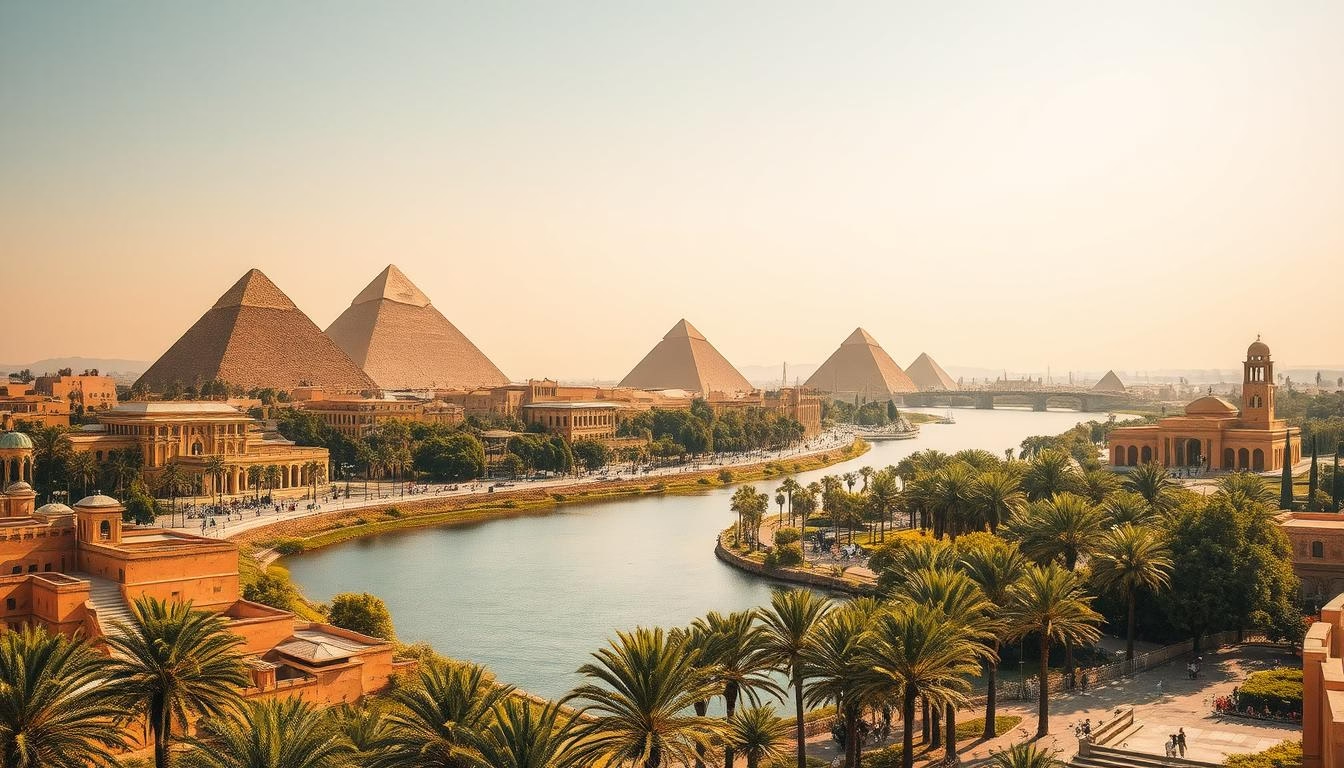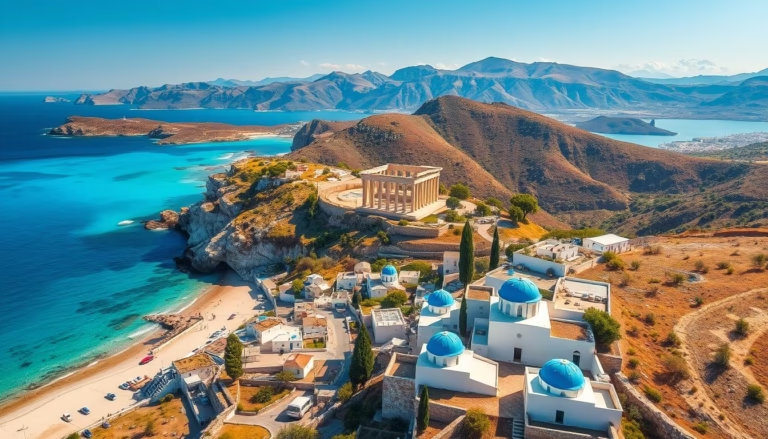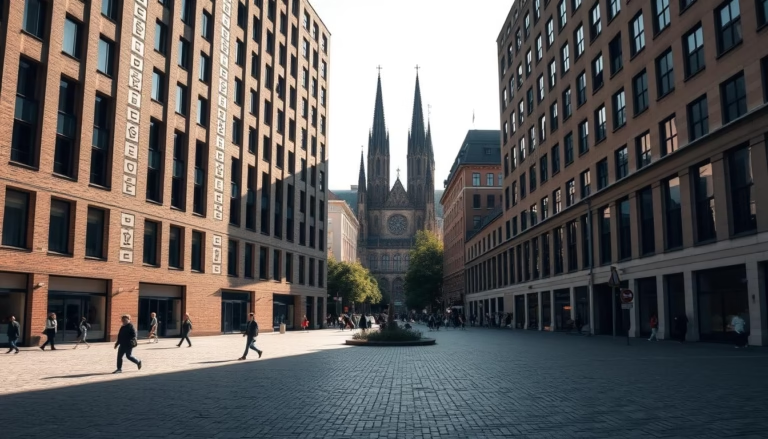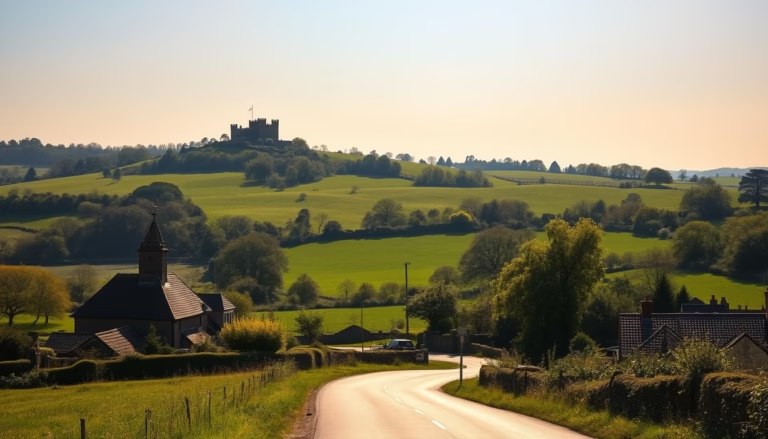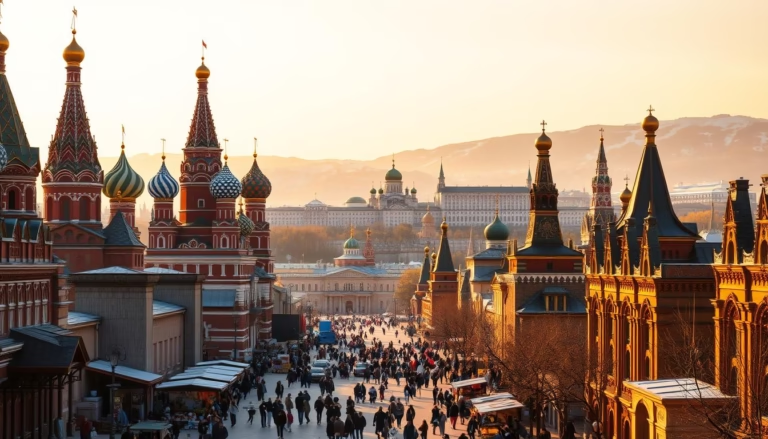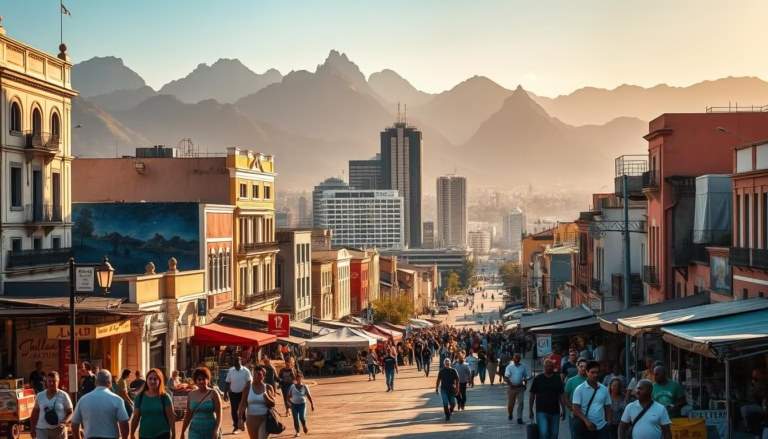The Best Cities to Visit in Egypt: A Travel Guide
Did you know Egypt attracts more history enthusiasts annually than the entire population of Iceland? This North African gem delivers unmatched adventures, blending 5,000-year-old pyramids with vibrant coral reefs and golden deserts. Travelers often face a delightful dilemma: how to experience it all in one trip.
From sailing the Nile’s timeless waters to snorkeling in the Red Sea, this land surprises at every turn. Modern resorts sit beside ancient temples, while bustling markets contrast with silent desert expanses. Each destination tells its own story, whether through hieroglyph-covered tombs or lively café culture.
Planning your journey requires balancing iconic landmarks with hidden treasures. This guide simplifies choices for first-time explorers and seasoned adventurers alike. Discover how to maximize your days while soaking in rich cultural experiences that linger long after you return home.
Key Takeaways
- Egypt combines ancient wonders with modern resort experiences
- The Nile River remains central to cultural and historical exploration
- Diverse landscapes range from underwater ecosystems to vast deserts
- Travel itineraries can blend relaxation with adventure
- Multiple destinations cater to different interests and trip durations
Experience the Magic of Egypt
Few locations on Earth let you touch artifacts older than time itself while sipping mint tea in a rooftop café. This land of contrasts reveals new layers at every turn – sun-bleached temples whisper secrets to glass skyscrapers, and spice-scented alleyways lead to luxury resorts.
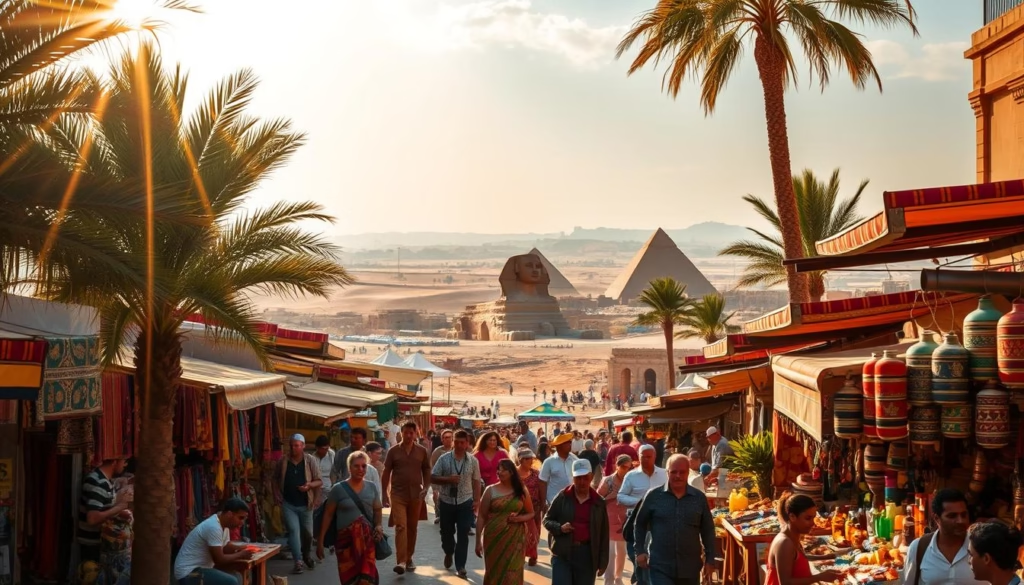
Where Millennia Come Alive
Walk through Karnak Temple’s towering columns at sunrise, and you’ll feel history pulse through the stones. The Nile – the world’s longest river – still feeds farms as it did for pharaohs. Over 120 pyramids stand testament to civilizations that mastered astronomy and architecture before paper existed.
More Than Ancient Stones
Modern Egypt thrills just as powerfully. Dive the Red Sea’s coral gardens one day, then barter for handwoven textiles in Aswan’s markets the next. Friendly locals share stories over strong coffee, while festivals blend Islamic, Coptic, and Pharaonic traditions.
| Experience Type | Iconic Example | Hidden Gem |
|---|---|---|
| Historical Wonders | Great Sphinx of Giza | Dendera Temple Complex |
| Cultural Immersion | Khan El-Khalili Bazaar | Nubian Village Homestays |
| Natural Beauty | White Desert National Park | Siwa Oasis Salt Lakes |
With 90% desert landscapes and 5 UNESCO World Heritage Sites, Egypt’s diversity astounds. Cruise operators now blend luxury amenities with archeological lectures, while new museums like the Grand Egyptian Museum make artifacts accessible. Discover why this nation remains among Africa’s top destinations for meaningful travel.
Cairo – A Blend of Ancient and Modern Wonders
Cairo isn’t just Egypt’s capital—it’s a living museum where every corner tells a story. This sprawling metropolis merges medieval Islamic architecture with contemporary urban energy. Walk its streets, and you’ll discover why it’s considered the Arab world‘s cultural heartbeat.
Exploring Islamic and Coptic Cairo
Islamic Cairo transports visitors through time. The 12th-century Citadel offers panoramic views, while narrow alleys lead to Ibn Tulun Mosque—one of Africa’s oldest places of worship. Don’t miss Muizz Street, lined with Mamluk-era monuments.
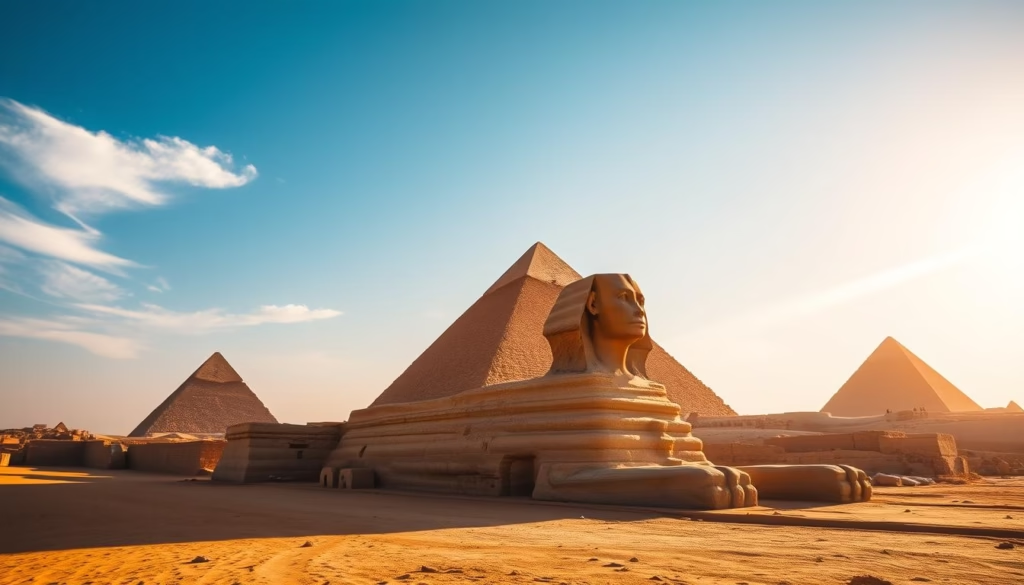
Coptic Cairo reveals Egypt’s Christian roots. The Hanging Church, suspended above Roman gateways, displays intricate woodcarvings. Nearby, the Coptic Museum houses rare manuscripts. These sites form a spiritual bridge between eras.
The Iconic Pyramids of Giza
No visit to the city is complete without seeing the pyramids giza. The Great Pyramid has guarded the desert for 4,500 years. Nearby, the Sphinx stares mysteriously across the sands. For deeper insights, pair your visit with a well-planned Cairo itinerary.
| Landmark | Era | Unique Feature |
|---|---|---|
| Great Pyramid | 2580 BCE | Last surviving ancient wonder |
| Alabaster Mosque | 1830 CE | Ottoman-style domes |
| Hanging Church | 3rd century | Suspended nave design |
As night falls, rooftop lounges buzz with shisha smoke and Nile views. From pharaonic wonders to vibrant street life, Cairo delivers endless discoveries.
Exploring the best cities to visit in egypt
Egypt’s urban centers offer more than gateways to antiquity—they pulse with contemporary energy. Historic markets thrive beside neon-lit boulevards, while age-old traditions shape modern creative spaces. This fusion creates destinations where every traveler finds their rhythm.
Cultural Heritage and Bustling Markets
Cairo’s Khan El-Khalili remains the ultimate test for bargain hunters. Vendors hawk brass lanterns and hand-blown glass alongside aromatic spice mounds. “The market’s heartbeat hasn’t changed in six centuries,” notes a local guide, “but today’s shoppers snap selfies with merchants.”
Alexandria’s Corniche blends Mediterranean breezes with Greco-Roman ruins. In Luxor, alabaster workshops near ancient temples keep Pharaonic crafts alive. These living museums prove culture isn’t confined to glass cases.
| City | Cultural Experience | Modern Feature |
|---|---|---|
| Cairo | Islamic architecture tours | Rooftop cocktail bars |
| Alexandria | Catacombs of Kom El Shoqafa | Bibliotheca Alexandrina |
| Hurghada | Bedouin culture nights | Marina promenade |
| Luxor | Papyrus-making workshops | Luxor Museum upgrades |
Modern Attractions and Nightlife
As stars replace desert sun, downtown Cairo buzzes with jazz clubs and avant-garde theaters. The capital’s Zamalek district mixes speakeasy vibes with Nile panoramas. Meanwhile, Red Sea resorts like El Gouna transform into open-air dance floors under moonlight.
Sharm el-Sheikh’s SOHO Square rivals Ibiza with LED-lit fountain shows. For quieter evenings, Aswan’s Nile-facing restaurants serve fusion cuisine as feluccas glide by. Whether your trip lasts three days or three weeks, Egypt’s cities deliver round-the-clock discovery.
Luxor – The World’s Greatest Open-Air Museum
Imagine standing where pharaohs paraded 3,500 years ago. Luxor transforms history into tangible reality, with its streets acting as corridors through time. This riverside gem holds more ancient treasures than some continents, earning its title as humanity’s largest outdoor gallery.
Majestic Temples and the Avenue of the Sphinxes
Karnak Temple’s towering columns dwarf visitors like ants. The newly restored Avenue of Sphinxes – lined with 1,350 statues – lets you retrace royal processions between Karnak and Luxor Temple. Guides often whisper, “These stones heard Ramses II’s chariots rumble by.”
Don’t miss Hatshepsut’s terraced temple, carved into golden cliffs. Its colonnades showcase hieroglyphs detailing the queen’s reign. Nearby, Medinet Habu’s colorful reliefs depict sea battles and victory parades frozen in stone.
Valley of the Kings and Royal Tombs
The Nile’s west bank hides 63 royal tombs in a desert valley. Tutankhamun’s burial chamber still displays original gold leaf and lapis lazuli. Archaeologists recently discovered new corridors using infrared scanners – proof more secrets await.
| Must-See Site | Unique Feature | Best Time to Visit |
|---|---|---|
| Valley of the Kings | Tutankhamun’s golden mask | Early morning |
| Karnak Temple | 134-column Hypostyle Hall | Sunset |
| Hot Air Balloon Ride | 360° desert views | Dawn |
Float above the Nile at sunrise for jaw-dropping views of temple complexes and farmlands. Later, sip hibiscus tea at a riverside café while planning your cruise down the world’s most storied waterway. Luxor proves the past isn’t gone – it’s breathing beneath your sandals.
Aswan – Serenity Along the Nile
Where golden sands meet emerald waters, Aswan offers a peaceful escape from Egypt’s bustling hubs. This southern location charms visitors with vibrant Nubian villages and granite cliffs framing the Nile River. Days here flow like the current—gentle and rich with discovery.
Nubian Culture and Riverside Charms
Colorful houses dot Elephantine Island, where people share stories over sweet hibiscus tea. Local markets brim with handwoven baskets and spices, while traditional music floats through warm evenings. The community’s legendary hospitality turns every trip into a cultural exchange.
Feluccas and Timeless Wonders
Glide past palm groves on a wooden sailboat at sunset—the perfect time to admire riverside temples. Don’t miss the monumental Abu Simbel complex, carved into mountainsides to honor Ramses II. Equally impressive, Philae Temple rises from its island home like a sandstone mirage.
History buffs can explore both Abu Simbel and Philae Temple in two days, while photographers capture golden light on ancient carvings. Aswan proves that Egypt’s magic isn’t confined to grand cities—sometimes, it whispers through reeds along quiet shores.
